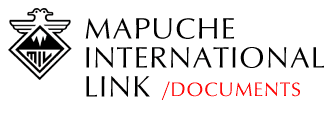
 |
|
|
| Home
| Front Page
| News
| Documents |
Environmental
| Archive
| Discussion
Point Links | About Us |
|
Statement delivered by Mr Reynaldo Mariqueo to the UN Working Group on indigenous Populations Document submitted to the In the name of the Committee of Mapuche Exiles, we would like to congratulate you and the Working Group on your concern and attention to the rights of indigenous nations. We would like to help your work by bringing to your attention the case of the Mapuche people of Chile, concentrating on five points in particular. We hope this will help you in formulating a set of general principles concerning the rights of indigenous peoples. As we all know, the injustices suffered by indigenous peoples, such as the theft of our lands, discrimination, racism, repression and even genocide are the same whether we look, for example, at the Amazon, Peru, Guatemala, Asia, Australia or the Pacific. So we feel that our testimony about the Mapuche nation is not for ourselves alone, but also expresses our solidarity with our brothers and sisters all over the world. One: The name Mapuche means ‘people of the land’, yet today we hold only 1,5% of the land we had when the Spanish arrived in 1541. It is vital to our survival as a people that we continue to hold our land communally and inalienably. But a decree signed by President Pinochet in March 1979, decree No, 2568 permits the Mapuche communal lands to be divided and pass into individual ownership; this is a real threat to our survival as a people, for since this decree was signed the number of Mapuche communities has declined from 2,066 to 655. We therefore need to have established a principle of the recognition of the communal nature of our landholdings and our right to recover lost lands. Two: The so-called ‘decolonisation’ of 1810 and the creation of the Republic of Chile caused the artificial division of the Mapuche nation by the creation of arbitrary frontiers. The Mapuche nation is divided by the frontier between Chile and Argentina, which puts an obstacle in the way of our free movement. We are not an isolated case, as there are many examples of similar situations in our continent. We therefore need enshrined in international law the right to move freely over frontiers which have been arbitrarily imposed on us. Three: Education must be based on communication. Official education in Chile is given in Spanish and there are many Mapuche children who cannot understand their teachers. Education imparted by a teacher who only speaks a foreign language is useless and has been the cause of many problems for our people. We would wish to see a policy of bi-lingualism in education and indeed in all official situations involving Mapuche people. Four: Religious freedom is recognised as a fundamental right in most societies. Amongst many indigenous peoples it is difficult to separate religion from other aspects of the social and cultural lives of our people. For example, we the Mapuche people have a religious ceremony called Nguillatun in which we worship our God Nguinechen. It is a ceremony which celebrates our close relationship with the land. At present we are obliged to ask permission of the authorities to hold our ceremonies and also suffer the humiliation of seeing the privacy of our ceremonies violated by the presence of police observers where no non-Mapuche should be present. We wish to see our right to freedom of worship respected, and our right to privacy in religious ceremonies. Five: Finally, Madame President, we would like to draw your attention to problems encountered by our organisations in the peaceful pursuit of our right to self-determination. The government has failed to protect us from attack by non-governmental paramilitary forces. For example, one of our Mapuche brothers, Manuel Melin Pehuen, was kidnapped from his community on 23 February 1984 and subsequently murdered by an extreme right-wing paramilitary commando group. The police do nothing to clarify such incidents or arrest the perpetrators. This is an example of indirect repression, of which we could present many more. There are also examples of direct governmental repression: on 27 March 1984, a peaceful meeting in which several Mapuche communities were participating was violently broken up by about 100 members of the police force who attacked many of those present, including children. This shows how our right to peaceful assembly has been denied. Another form of direct repression is the arrest of Mapuche leaders. Between 1984 and 1985, for example, at least 30 Mapuche leaders have been arrested, others have been exiled to other parts of Chile and yet others expelled from Chile. We would therefore wish to see recognised our right to organise ourselves in the pursuit of self-determination. Madame President, these are the five points to which we wish to draw your attention to, and we would be grateful if your Working Group would take into consideration when drafting your set of principles on indigenous rights. I wish to emphasise, that for us, rights to land, religion, education, culture, freedom of movement, organisation and self-determination are all inextricably linked even though necessarily divided into principles. Thank you very much for giving us this opportunity to describe and express the aspirations of the Mapuche nation.
Geneva 2nd. August 1985.
|
| |
||
|
||